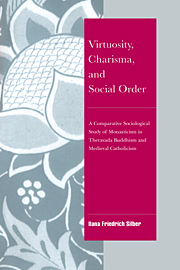 Virtuosity, Charisma and Social Order
Virtuosity, Charisma and Social Order Published online by Cambridge University Press: 09 October 2009
Like any style or method of work, comparative macrosociology has distinctive strengths but also limitations. Following the development of a constellation of variables over many centuries and across civilizations makes it perhaps possible to highlight ideal-typical formations and broad structures, but does not claim to engage in the kind of rich and detailed analysis of more limited material – something akin to Geertz's programmatic call for “thick description” – better able to render the rich texture and “fine grain” of social life. Although this is true of any aspect of social life in general, I find the problem especially acute and challenging, for my own purposes, concerning the study of cultural orientations in particular. Stating the dilemma from the Weberian angle, the problem is how to conciliate the Weberian quintessential emphasis on the interpretation of meaning and the equally Weberian emphasis on the importance of multifactorial comparative sociological analysis.
The aim of the two preceding chapters was, first, to define the essential features of the virtuoso–society complex, and second, to identify the ideological and institutional forces shaping the expression of this complex in the two civilizations in which it achieved its fullest deployment. Having thus gone through rather “normal” motions of a comparative macroscopic analysis, I intend now to probe a bit further into the ideological appeal and symbolic meaning of virtuoso elites.
To save this book to your Kindle, first ensure [email protected] is added to your Approved Personal Document E-mail List under your Personal Document Settings on the Manage Your Content and Devices page of your Amazon account. Then enter the ‘name’ part of your Kindle email address below. Find out more about saving to your Kindle.
Note you can select to save to either the @free.kindle.com or @kindle.com variations. ‘@free.kindle.com’ emails are free but can only be saved to your device when it is connected to wi-fi. ‘@kindle.com’ emails can be delivered even when you are not connected to wi-fi, but note that service fees apply.
Find out more about the Kindle Personal Document Service.
To save content items to your account, please confirm that you agree to abide by our usage policies. If this is the first time you use this feature, you will be asked to authorise Cambridge Core to connect with your account. Find out more about saving content to Dropbox.
To save content items to your account, please confirm that you agree to abide by our usage policies. If this is the first time you use this feature, you will be asked to authorise Cambridge Core to connect with your account. Find out more about saving content to Google Drive.